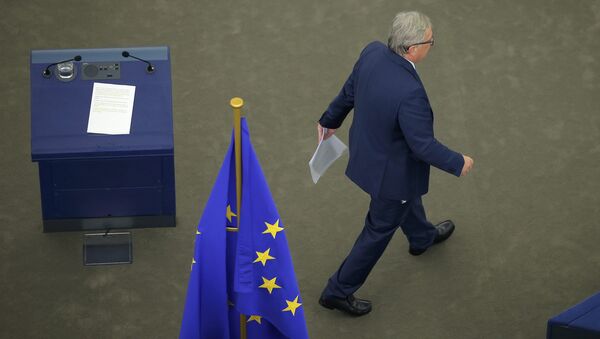The survey, undertaken by YouGov on behalf of the think tank, Demos, found that while Britons held the most euroskeptic feelings towards the EU, significant amounts of those surveyed in Sweden (57 percent), France (55 percent), Spain (41 percent), Poland (40 percent) and Germany (39 percent) were in favor of either leaving the union or reducing its powers.
Support for the EU continuing in its current form was limited, while there was also little support for the EU to be granted more extensive powers.
NEW polling for @Demos' project on the Politics of Fear shows a striking mood of pessimism in Europe: https://t.co/4YzSRuuA7m pic.twitter.com/TdPxnOBADy
— Demos (@Demos) October 25, 2016
With the EU undergoing its most turbulent period following Brexit, migration issues and the Greek debt crisis, it seems citizens shared the uncertainty with 40 percent of respondents across all countries feeling pessimistic about Europe's short-term prospects, compared to 19 percent who shared an optimistic outlook.
The survey also found low levels of trust in national and EU governments, with 66 percent of French respondents and 60 percent of Britons reporting low trust in the European Commission.
'Europe Seeing Implications of Crises'
The findings come amid increased debate about the role of the EU, with euroskeptic movements seemingly gaining popularity across the continent.
On top of the UK's decision to vote to leave the union, there are significant anti-EU movements in France, the Netherlands and Austria, while countries such as Hungary, Poland and Slovakia have openly criticized the policies and approach of the EU establishment in Brussels, calling for more power to be delivered to national governments.
2 counter #Euroscepticism citizens 2 be part of narrative EU action: why/how is #EU acting? Prof Xanthaki @collegeofeurope #BetterRegulation
— Wybe Douma (@WybeDouma) October 10, 2016
"Europe has experienced a series of crises over the last few years and we're starting to see the implications for public attitudes, and national and regional politics," said Ralph Scott, head of citizenship at Demos.
"The rise of populist parties has gone hand-in-hand with economic precarity and stagnating incomes for some, rising concern over diversity, and an apparent inability of mainstream political parties to address these issues."
NEW poll for our Politics of Fear project reveals widespread sense of precariousness, uncertainty & pessimism in EU https://t.co/4YzSRuuA7m pic.twitter.com/SWYDHgt4z5
— Demos (@Demos) October 25, 2016
While the impacts of globalization have been suggested as reasons behind the rise of populist politics and anti-establishment sentiment in the EU, the poll found that respondents in all countries apart from France thought the globalized world had had a positive impact on their respective countries.
"This polling shows that… people's attitudes to the European project and even globalization itself are changing, potentially with drastic results. Of particular concern is France, where the people are very pessimistic about their prospects, appear skeptical of the benefits of globalization and diversity and don't appear to trust political institutions to find a resolution."




